It's also lengthened to nee ねえ, nee ねぇ, or nee ねー, in which case it's homonymous with the relaxed pronunciation of the nai ない suffix.
Manga: Black Lagoon (Chapter 1, Chase for ring-ding ships)
Usage
Confirmation
The ne ね particle can be used to seek confirmation from the listener.For example:(宮崎和人, 2002:2)
- Tanaka-san desu ne?
田中さんですね?
[It] is Tanaka-san, right?
[You] are Tanaka-san, right? - hai, sou desu
はい、そうです
Yes, that's right.
The ka か particle can be used to make such questions, too. However, there's a difference between the ne ね particle and the ka か particle.
The ne ね particle is used to expresses a presumption of the speaker, and seek confirmation from the listener about that presumption. Meanwhile, the ka か particle expresses doubt regarding the statement.
In other words, if you were to replace ne ね by ka か, you're likely to get the following interpretation instead:
- Tanaka-san desu ka?
田中さんですか?
[It] is Tanaka-san?- You're telling me Tanaka-san is the one that did this thing, as opposed to Tarou-san, or Hanako-san?
- You're telling me to deliver this package to Tanaka-san, and not to anyone else?
This happens because the sentence above expresses doubt about the statement Tanaka-san desu, "[it] is Tanaka-san." The speaker heard someone mention Tanaka-san and is uncertain Mr. Tanaka is actually related to the situation.
Another example:
- kore wa neko tte iu-n-desu ne?
これは猫って言うんですね?
This is called a cat, right?
This is a cat, isn't it?- Tell me I'm right.
- kore wa neko tte iu-n-desu ka?
これは猫って言うんですか?
This is called a cat?- I don't believe it, there's no way this is a cat.
- Or: I'm really not sure about this, I need the opinion of someone who's a specialist in cats to tell me if this thing is a cat or not.
So the ne ね particle is used in this way when you're already assuming something might be true, because you've heard it somewhere, or guessed it, but you're confirming it with the listener either because they have more knowledge about the topic than you do, or to make sure there's nothing wrong with what you said.
Agreement
The usage of the ne ね particle can be generalized further as seeking agreement, rather than confirmation. Evidence of this is that the ne ね particle can be used in the answer, also.For example:(宮崎和人, 2002:2)
- kyou wa ii tenki desu ne
今日はいい天気ですね
Today, [it] is a good weather, isn't it?
The weather is good today, isn't it? - sou desu ne
そうですね
Yes, that sounds about right.
In the example above, both questioner and answerer use the ne ね particle. That's like two people nodding to themselves about something they find true in common.
Once again, the usage of ne ね in the first example expresses a presumption. If you changed it to ka か, you'd have a doubt instead:
- kyou wa ii tenki desu ka?
今日はいい天気ですか?
The weather is good today?- What are you talking about? Are you crazy?! It's so cloudy out there that you could upload your files to that sky!
Manga: Assassination Classroom, Ansatsu Kyoushitsu 暗殺教室 (Chapter 1, 暗殺の時間)
- Context: a tentacle monster destroys the moon and will destroy the Earth next year unless his class of assassin students manage to kill him before then.
- koroseru to ii desu nee
殺せるといいですねぇ
If able to kill: good, right?
It would be good if [you] could [manage to] kill me, don't you agree? - sotsugyou made ni
卒業までに
Until graduation. (i.e. within one year.)- See also: dislocation.
Manga: Kaguya-sama wa Kokurasetai ~Tensai-Tachi no Ren'ai Zunousen かぐや様は告らせたい~天才たちの恋愛頭脳戦~ (Chapter 6, 白銀御行は隠したい)
- Context: a guy remembers his dark past.
- kanojo inai tte~~!
彼女居ないってー!
[He said] [he] doesn't have a girlfriend! - isou ni nai mon ne~~!
居そうに無いもんねー!
[He] doesn't seem like [he] would have [one], right~~!- Here, a second girl says the guy doesn't looks like he would have a girlfriend. She's judging him by his appearances.
- mon もん
(used when a sentence justifies a previous one, for example: he doesn't look like he'd have a girlfriend, that's "why" him not having a girlfriend isn't unexpected.)
- chou ukeru!
超ウケル!
[That's] super funny!- ukeru 受ける
To receive. (literally.)
To find funny. (slang.)
- ukeru 受ける
- fufu'
ふふっ
*giggle*
Manga: Mahou Sensei Negima! 魔法先生ネギま! (Chapter 1, お子ちゃま先生は魔法使い!)
- Context: a tsundere and her friend run to school.
- ni shitemo Asuna
にしてもアスナ
[That said,] Asuna, - ashi hayai yo nee
足速いよねー
[Your] legs are fast. (literally.)
You [run] fast.- Don't you agree?
- Don't you agree?
- watashi kore ya no ni
私コレやのに
Even though [for] me, [I] have this.- This means the roller-skates. She's running at the same speed the other is rollerskating.
- warukatta wa ne
tairyoku baka de
悪かったわね
体力バカで
(this is a dislocation.)- tairyoku baka de
warukatta wa ne
体力バカで
悪かったわね
For being a physical-strength baka, [I'm sorry]. - The phrase tairyoku-baka means she has an stupid amount of physical strength. She's stupidly strong, energetic, fast, and so on. She's apologizing for that, sarcastically.
- More literally, warukatta means "[it] was bad." Asuna is admitting "it was bad" of her to be a tairyoku-baka, so she's to blame for that, it's her fault, consequently, it's an apology.
- The ne ね particle here implies Asuna is trying to get the listener to agree with the statement "warukatta wa." In other words: "yep, let us both agree it's my fault for being born this way," basically.
- tairyoku baka de
Insistence
The ne ね particle can also be used to insist on agreement, rather than to request it.This is completely different from the usage we had before. Before, the speaker wasn't sure they were right, and used the ne ね particle to check for consensus. In this case, the listener is very sure that they're right, and is using the ne ね particle to demand consensus.
Observe:
- ki wo tsukete ne
気をつけてね
Pay attention, alright?
Take care, okay? - abunai kara ne
危ないからね
Because [it] is dangerous, alright? - sawaranaide ne
触らないでね
Don't touch [it], okay? - ato de oshiete ne
後で教えてね
Tell [me] about [it] later, okay?
In none of the sentences above the speaker is uncertain about their statement.
For example, in the sense "it's because it's dangerous," the speaker didn't use ne ね because the listener might contradict them somehow, like by saying "no, it's because it's expensive."
They used ne ね because they're demanding agreement, or consent, from the listener. They're saying: it's because it's dangerous, GOT IT??? YOU HEAR ME??? Did that get inside your head??? And so on.
In sentences like "take care" and "tell me about it later," of course the listener may refuse: "no, I won't take care," or "no, I won't tell you about it later," but what the speaker expects is just a nod of agreement, to make sure they're both on the same page.
Manga: Black Lagoon (Chapter 4, Rasta Blasta PT.3)
- Context: Balalaika makes sure someone understands the situation.
- kanchigai shinaide ne?
カン違いしないでね?
Don't get the wrong idea, okay? - onegai janai no, meirei.
お願いじゃないの、命令。
It's not a favor, it's an order.
Self-Confirmation
The ne ね particle can also be addressed to oneself. In this case, the speaker is making sure, with themselves, that their statement is appropriate.This usage of ne ね can be found when the questioner doesn't use ne ね, but the answerer does.
For example:(宮崎和人, 2002:3)
- {kazoku wo gisei ni shite-mo} kanojo wo aiseru?
家族を犠牲にしても彼女を愛せる?
Can you love her {even if [you] [have to] sacrifice [your] family}? - wakarimasen ne
分かりませんね
[I] don't know
- ima nan-ji desu ka?
いま何時ですか?
Now is what hour? - eeto, nana-ji desu ne.
ええと、7時ですね。
Erm, it's seven o'clock, I guess.
In both sentences above, the answerer isn't able to give a straight, clear answer, and the ne ね particle expresses that.
Note that, since neither sentence is actually a question, the ka か particle can't be used above.
Furthermore, if the sentence is about something that the speaker is certain about, the ne ね particle can't be used, since there's no need to confirm the information with oneself. For example:(宮崎和人, 2002:3)
- osumai wa dochira desu ka?
お住まいはどちらですか ?
Where do [you] live? - *Koube desu ne
神戸ですね
(wrong.)- The answerer certainly knows for certain where they live, so it doesn't make sense to use ne ね here.
Despite the usage above, the ne ね particle can't be used in monologues: when talking to oneself. This is a key difference between the ne ね particle and the na な particle: although their usage is basically identical, the na な particle can be used when talking to yourself.(田窪・金水, 1996, など, as cited in 宮崎和人, 2002:4)
Note: basically identical refers only to one specific use of the na な particle, as a sentence-ending particle which is used like ne ね, and be lengthened to naa なあ. Pretty much every other use of the na な particle, like the na な copula, is completely different from ne ね.
Observe the examples below:
- dou shiyou?
どうしよう?
How will do? (literally.)
What should [I] do? - dou shiyou ka na
どうしようかな
I wonder what I should do. - dou shiyou ka ne
どうしようかね
I wonder what we should do.
Both sentences are expressing the speaker's thoughts.
However, the first sentence, with ka na かな, can be used in a monologue. The speaker can be wondering to himself what he's going to do. In manga, this can even show inside a thought bubble.
The second sentence, with ka ne かね, is throwing those thoughts at the listener. The speaker is wondering about what to do, maybe he isn't sure about what to do, and maybe he wants the listener to help in thinking of what to do.
In any case, a listener is necessary for the ne ね sentence, whereas it's not necessary for the na な sentence.
Manga: Doraemon ドラえもん (Chapter 1)
- Context: Nobita hears a voice telling him things.
- dare da,
{hen na koto
iu} yatsu wa.
だれだ、へんなこというやつは。
Who is it, the one [who] {says weird things}? - dete-koi'
出てこいっ。
[Show yourself]!- dete-koi 出て来い
(imperative form of.) - dete-kuru 出て来る
To leave and come. (i.e. to leave wherever they're hiding and come face Nobita.)
- dete-koi 出て来い
- .........dare mo inai.
・・・・・・・・・だれもいない。
.........there's nobody [here]. - kimochi warui naa.
気持ち悪いなあ。
[This is] unpleasant, uh.
[This is] creepy, uh.
In the example above, Nobita couldn't have said nee ねえ instead of naa なあ, because he's talking to himself: there's no listener for him to to direct his "this is creepy" opinion at.
Manga: Horimiya ホリミヤ (Chapter 1)
- piasu ooi na kono hito...
ピアス多いなこの人・・・
[He] has a lot of piercings, this person. - oniichan koohii tte nigai no?
おにーちゃんコーヒーってにがいの?
Oniichan, is coffee bitter?
- Oniichan is used by children to refer to older male teenagers sometimes.
- nigai nee
にがいねーー
It's bitter~~
In the example above, na な can't be replaced by ne ね because it's inside a thought bubble.
The speaker, or rather, thinker, is thinking an opinion to themselves, inside their heads, so, unless they're communicating telepathically with a character that can read minds or something, there's no listener, so ne ね can't be used.
Conversely, since the pierced guy is actually talking to someone: the kid, he can use nee ねー in nigai nee にがいねー to confirm what the kid presumpted: coffee is, indeed, bitter.
Although a listener isn't necessary for na な, that doesn't mean that the absence of a listener is necessary. As mentioned previously, the usage of na な and ne ね is basically identical, so if a listener is present, the particles become interchangeable.
- sou kamoshirenai naa
そうかもしれないなあ
It may be that way.
That may be right.
That might be the case.
What you're saying sounds like it might be what's actually going on for real in this situation. - sou kamoshirenai nee
そうかもしれないねえ
(same meaning.)
Interjection
The ne ね particle can also be used as an interjection. When this happens, ne ね goes in the middle or even at the start of the sentence, rather than at the end.When used at the start, ne ね works kind of like "hey" in English. It's used to call for the listener's attention, or to press the listener for answers.
- ne, kiiteru?
ね、聞いてる?
Hey, are [you] listening [me]? - ne, dou suru?
ね、どうする?
What are [you] gonna do?
Manga: Karakai Jouzu no Takagi-san からかい上手の高木さん (Chapter 1, 消しゴム)
- Context: Takagi 高木 catches Nishikata 西片 acting suspiciously.
- nee, Nishikata.
ねえ、西方。
Hey, Nishikata. - na, nani!? Takagi-san!?
な、何?!高木さん!?
W-what [is it]?! Takagi!? - nani shite-n-no?
何してんの?
What are [you] doing? - betsuni... nanimo...
別に・・・何も・・・
Nothing... in particular... - fuun.
ふーん。
*suspicious humming of doubt.*
In this case, it can be repeated for maximum annoyance:
- ne, ne, nee, kotaete yo
ね、ね、ねぇ、答えてよ
Hey, hey, heey, answer [me]. - nee, nee, asobou yo!
ねぇ、ねぇ、遊ぼうよ!
Hey, hey, let's play!
It can be self-quoted:
- nee tte ba
ねぇってば
I'm saying "nee." (or something like that.)
And combined with other interjections, like ano あの.
Manga: Holy Land, ホーリーランド (Chapter 2)
- Context: someone doesn't know the girl's name.
- ano ne~~'
あのネ~~っ
[Hey, look~~] - {kurasu no ko no namae kurai
oboetoita} hou ga
ii yo
クラスの娘の名前位覚えといた方がいいヨ
It's better if {[you] learned the names of the girls of [your] class at least}. - toku ni kawaii ko wa!
特にカワイイ娘は!
Specially the cute girls!
Manga: Hataraku Saibou はたらく細胞 (Chapter 1, 肺炎球菌)
- nani-ka atta no?
何かあったの?
Did something happen? - ano ne ano ne
あのねあのね
You see, you see. - toraburu de kouji ga okureteru no
トラブルで工事が遅れてるの
Due to trouble, the construction work is delayed. - gomen nasai!
ごめんなさい!
Sorry!
The ne ね interjection can also be used in the middle of sentences. In this case, it calls attention to the phrase preceding the particle. This basically always happens with the first phrase of the sentence, which is basically always the topic of the sentence.
Consequently, the most common case of ne ね used this way is watashi wa ne 私はね, ore wa ne 俺はね, boku wa ne 僕はね, and so on, which mean the speaker is talking about themselves.
Manga: Black Lagoon (Chapter 1, Chase for ring-ding ships)
- Context: Rock refuses to go back to his old life.
- ore wa ne, mou shinderu-n-desu yo.
俺はね、もう死んでるんですよ。
I, you see, am already dead. - anta ga sou itta.
あんたがそう言った。
You said so.
Other common uses are:
- kyou wa ne
今日はね
Today, you see. - kore wa ne
これはね
This, you see. - tsumari wa ne
つまりはね
In summary, you see.
All the phrases above can have the copulas da だ and desu です between wa は and ne ね.
- sore wa ne
それはね
About that, you see. - sore wa desu ne
それはですね
(same meaning.) - sore wa da ne
それはだね
(same meaning, too.)
Homonyms
In rare cases, ne ね is actually nai ない. This happens because nai ない can be pronounced as nee ねぇ instead. And if that were to be cut short, it would become ne ね. Observe:- ore dewanai
俺ではない
Me, [it] is not.
[It] isn't me. - ore janai
俺じゃない
(same meaning.) - ore janee
俺じゃねぇ
(same meaning.) - ore jane
俺じゃね
(same meaning.)
In shorter janee is mostly used in negative questions.
- sore ore jane?
それ俺じゃね?
Isn't that me? - ore jane ka!
俺じゃねか!
It's me, huh!
Anime: Kobayashi-san Chi no Meidoragon 小林さんちのメイドラゴン (Episode 4)
- maji yabaku ne
『マジやばくね』
Isn't it seriously incredible?- Contraction of:
- maji yabakunai
マジやばくない - Since yabai means just that something is intense, whether because it's good or because it's bad, this sentence ends up becoming able to be used in response to good things and to bad things at the same time.
- If someone says something good, maji yabaku ne: isn't that awesome? If someone says something bad, maji yabaku ne: isn't that awful? Or isn't that dangerous?
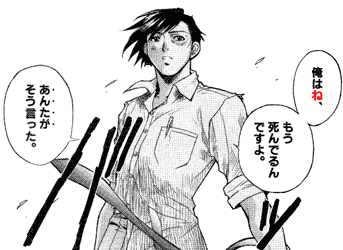
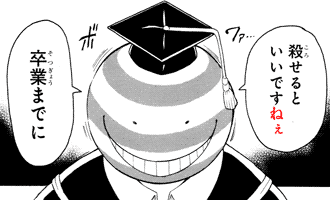
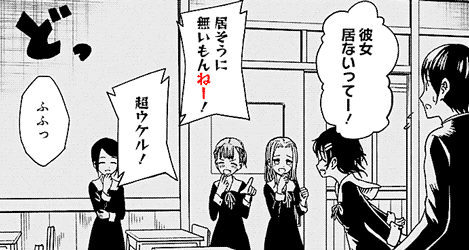
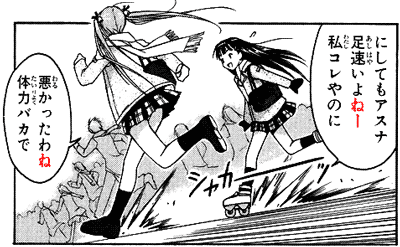

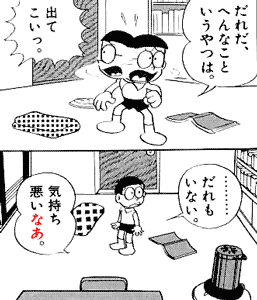
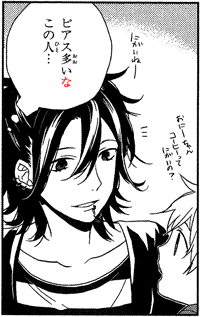
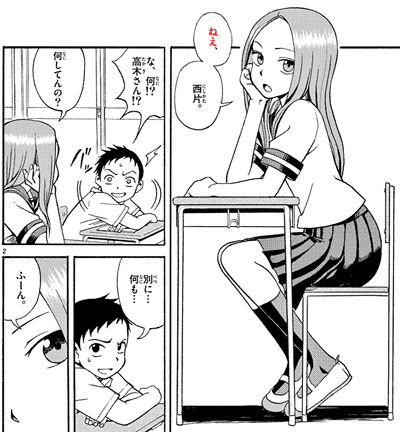
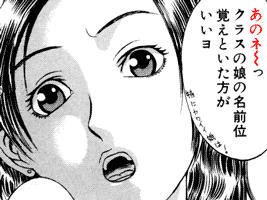
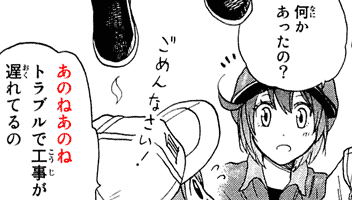

No comments: